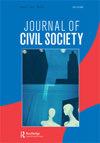Consultation not Contestation : Brazilian civil society in EU-Mercosur Association Agreement negotiations
IF 0.9
Q3 POLITICAL SCIENCE
引用次数: 0
Abstract
The aim of this article is to explore the role of Brazilian civil society in interregional trade between 2003 and 2020, with a focus on negotiations between the European Union and the Southern Common Market (Mercosur). I draw on document analysis from Mercosur’s online archives and from interviews with actors engaged in trade at the time analyzed, supported by the Modes of Participation framework. This approach allowed for a uniquely critical perspective on Mercosur’s participatory structure. I aim to find out: who was represented in negotiations; what forms of participation were permitted; and who were the actors who pushed for the creation of participatory channels. My hypothesis is that, by establishing modes of participation, government elites have filtered out dissenting voices from channels which could potentially influence negotiations, while civil society representatives created participatory spaces in response to perceived limitations. Results show that societal dissent was contained first by a proliferation of channels and mechanisms for limited participation from 2003, and from 2016 onwards by limiting access to government officials and reports on negotiating rounds. Furthermore, it was found that contentious actors, excluded from negotiations, created their own spaces for participation, such as drafting collective statements and lobbying Brazilian congresspeople.协商而非争论:欧盟-南方共同市场联盟协定谈判中的巴西公民社会
本文旨在探讨2003年至2020年期间巴西民间社会在区域间贸易中的作用,重点关注欧盟与南方共同市场(Mercosur)之间的谈判。在参与模式框架的支持下,我借鉴了南方共同市场在线档案的文件分析,以及对当时从事贸易的行动者的采访。这一方法允许对南方共同市场的参与性结构进行独特的批判。我的目标是找出:谁代表了谈判;允许何种形式的参与;是谁推动了参与渠道的建立。我的假设是,通过建立参与模式,政府精英从可能影响谈判的渠道中过滤掉了不同的声音,而公民社会代表则创造了参与空间,以回应他们所感受到的限制。结果显示,从2003年开始,社会异议首先通过有限参与的渠道和机制的扩散得到遏制,从2016年开始,通过限制接触政府官员和谈判回合的报告来遏制。此外,有争议的行为者被排除在谈判之外,创造了自己的参与空间,例如起草集体声明和游说巴西国会议员。
本文章由计算机程序翻译,如有差异,请以英文原文为准。
求助全文
约1分钟内获得全文
求助全文

 求助内容:
求助内容: 应助结果提醒方式:
应助结果提醒方式:


